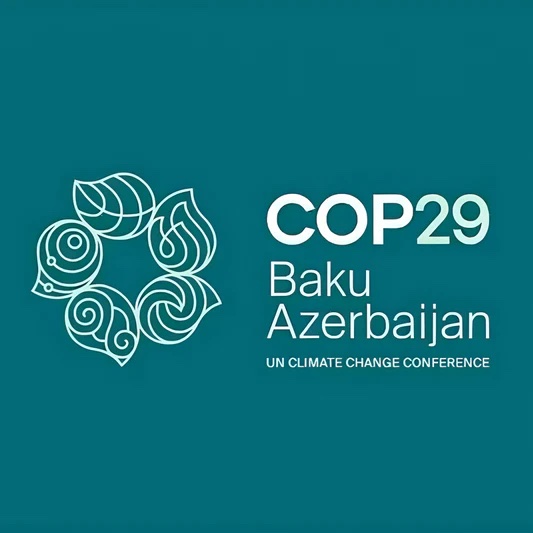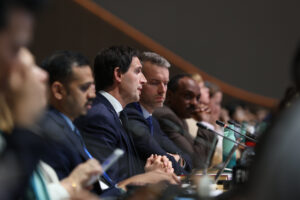COP29 update: Day 10, 21 November

Greetings from Baku!
This morning new texts arrived across most of the main negotiating tracks, ranging from the New Collective Quantified Goal to Article 6.
A draft presidency document synthesising positions on the New Collective Quantified Goal was the most eagerly-awaited item, and it didn’t disappoint.
This was the first iteration of the text that had been made public, and it had reportedly been pared down from around 25 pages to just ten, but it contained some potentially transformative language:
“32. [Encourages Parties and other relevant actors to continue to use, explore, develop and][Urges developed country Parties to] scale up finance through the use of grants and innovative instruments that create fiscal space for developing countries including debt-for-climate swaps, guarantees, and equities, and instruments that mobilize new sources of climate finance and private finance such as green bonds, hybrid capital, first-loss instruments and local currency lending and high-integrity voluntary carbon markets, taking into account national circumstances in an equitable and just manner;”
and
“33. Acknowledges the need to continue to explore and develop, as applicable and in line with national circumstances, equitably designed domestic and international innovative instruments targeted towards the fossil fuel sector and other high-emitting sectors in line with the polluter-pays principle such as carbon pricing and calls for a global quantitative target covering a significant amount of global emissions by carbon pricing by 2030 and reach ambitious carbon prices by 2035;”
To be sure, the entire NCQG text is bracketed, which signifies there is still deep disagreement on the contents, but the fact that the text has been cut by more than 50% without removing the carbon markets/prices references could be taken as a positive sign.
Our own observers are careful to reiterate that further versions of the text will no doubt appear before COP29 ends, and that there also remains the possibility that negotiators will leave Baku without an agreement.
The text also contained a brief reference to CBAM, in which Parties are called to “assess the negative impacts of unilateral measures, taking action to phase out those measures, and mitigating their impacts.”
The environmental NGO community was not pleased by the references to markets. The daily ECO newsletter summed up the view of many by saying “carbon markets are not climate finance”, and singled out IETA for the traditional harsh words.
Just after midday, Parties met in a “Qurultay” (a traditional Azerbaijani gathering for collective decisions) after midday to discuss all the draft texts, and it seemed that nobody was happy.
Parties intervened on all the texts – the NCQG, the Just Transition Work Programme, the Mitigation Work Programme, the Global Goal on Adaptation, the UAE Dialogue, response measures, gender, and of course Article 6 – of which more below.
More than once we heard “deeply disappointed”, “concerned” or “unacceptable”. The European Commission’s Woepke Hoekstra called the package “imbalanced, unworkable and unacceptable,” while New Zealand was “deeply frustrated”.
On the whole, developed countries (and some developing country parties) expressed unhappiness that developing countries were hanging back from showing ambition and commitment on mitigation and taking forward the Global Stock Take, which encompasses pledges on renewable energy, energy efficiency and a fossil fuel phase-out.
Many of them also complained that the NCQG text is still too long. “Cut it in half,” said Norway.
The European Union said “we need to do more, not less, than the UAE consensus on mitigation,” and New Zealand added that it is “unacceptable that mitigation outcomes from Global Stock Take are in danger of being erased.”
In turn, numerous developing country Parties expressed anger that the NCQG text contained no figures relating to financial contributions. Peru (for AILAC) said they were “deeply disappointed that there is no target for finance in the document”, while Colombia said that “without a quantum, we’re negotiating over nothing”.
On behalf of G77 and China, Uganda said “we need a figure as a headline to determine whether we are making progress. [We] have been very clear that we should not leave Baku without a quantum.”
(The COP Presidency later told Climate Home it did not think presenting a wide range of numbers for the financial goal would have been useful in this version of the draft. “The next iteration – to be released tonight – will be shorter and will contain numbers based on our view of possible landing zones for consensus,” they added.)
Speaking for the Coalition for Rainforest Nations, Honduras singled out the reference to the VCM in the NCQG text, and said it wants any reference to carbon markets to identify Article 6 instead, as a guarantor of the highest environmental integrity.
The Qurultay went on for more than three hours, giving all Parties a chance to have their say, before ministers went back to work. By the end of the afternoon it was made clear that there were unlikely to be text updates today.
With all the attention now focusing on the ministerial consultations and further iterations of texts, we were heartened to hear that Parties are also keeping an eye on the next big task after COP29: setting new NDCs.
At a press launch at COP today, seven Parties – Canada, Chile, the European Union, Georgia, Mexico, Norway and Switzerland – announced today that they intend to set 2035 NDCs that are:
- Consistent with the IPCC emissions trajectories and the global stocktake call for deep, rapid, and sustained reductions in greenhouse gas emissions in line with 1.5°C;
- Absolute, economy-wide reduction targets covering all greenhouse gases, sectors, and categories; and
- Aligned with steep and credible emissions reductions toward their respective mid-century net zero goals, consistent with a linear or steeper trajectory.
The statement from the group also recognised that four countries – Bhutan, Madagascar, Panama and Suriname – have already reached net zero, while three others, the United Kingdom, Brazil and the UAE, are the first to have submitted their updated NDCs.
Speaking of which, we’ve noticed in the last couple of days that the United Kingdom appears to have joined the Umbrella Group in the talks, which is confirmed on the UN’s website. Until last year the UK had represented itself as not aligned with any of the main negotiating blocs, though in the wake of Brexit many observers had been expecting an eventual alignment with the Umbrella Group.

In the negotiations
The Qurultay plenary heard quite a few fairly detailed interventions on the substance of Article 6, with different views still being heard on the role of the Article 6.2 registry in particular.
On the role of authorisation of mitigation outcomes, Switzerland insisted that ITMOs being authorised for Other International Mitigation Purposes should not involve authorisation by one Party only, a position that threatens the role of Article 6 in CORSIA, for example.
Samoa, for the AOSIS group, called for “clear headings for share of proceeds and overall global mitigation of global emissions in the agreed electronic format”.
Bolivia, for the LMDC group, said authorisation should take place at any time in the process: “a host Party should not be pressured into authorising its units.”
Bolivia’s Diego Pacheco told the plenary that “some Parties see the opportunity to add so many requirements that it translates into barriers to entry,” and cited the texts on first transfer. He said the draft language was “so complicated and extremely technical that it prevents most of the Parties to engage in discussion around it.”
And on transparency, EU member states said that this represents a red line for many. “Upfront transparency cannot be optional; it needs to be mandatory,” Denmark said. The Netherlands noted that this transparency item had vanished from the latest draft, and said it could not accept the Article 6 text as it stood.

Thursday at the IETA Business Hub
With our side-event programme having concluded on Wednesday, the IETA Business Hub took on a more social character on Thursday, with delegates enjoying the chance to catch up, or to place a quick bet on the day and time at which this year’s COP will close.
The media pool has been conducting a similar poll amongst its members, and the majority of responses appear to suggest the early hours of Sunday morning as the likeliest “gavel time”.
IETA held its second and final media briefing of COP29, at which Andrea Bonzanni gave our impressions of the latest text, and we’ll take the liberty of reproducing here his comments on the EU’s position on Article 6, which may be of interest.
The EU asked for four things entering this COP, and added an additional one when further guidance on Article 6.4 started to be discussed, he told an audience of press and IETA members.
“They asked for a definition of a cooperative approach; they asked for additional elements to be included in the initial report that Parties have to submit when they start cooperation; they requested further guidance on the definition and application of first transfer (a technical but important element for tracking of ITMOs in the system); and they asked for sequencing of the process between the initial report and authorisation of ITMOs.”
“Later, when the Article 6.4 guidance was being discussed, the EU asked for the Supervisory Body to do work on the like-for-like replacement of credits in case remediation of reversals was needed, on whether and how all types of removals can be credited in the mechanisms.”
In the latest text, Europe had got about half of these five asks, he said.
“There is text on first transfers that I believe is what they asked for; the additional elements of the initial report are in an Annex to the draft decision and the text only says Parties are encouraged to consider these elements.”
“Europe also got Article 6.4 recognition of the need to work on like-for-like replacements.
“However, the text contains no definition of cooperative approaches and no language on sequencing.”
IETA post-COP debriefing
As COP winds to a close, we’d just like to remind you that you can relive the whole of the last two weeks – sub-par coffee and all – in the company of our policy staff, UN secretariat staff and invited Party negotiators at two post-COP briefings that we’ll be hosting on Tuesday November 26.
The first instalment will take place at 1000 CET (0900 GMT, 1700 Singapore), while the second will be held at 1700 CET (1600 GMT, 1100 New York).
We’ll circulate an invitation with the relevant links by email to all members tomorrow.